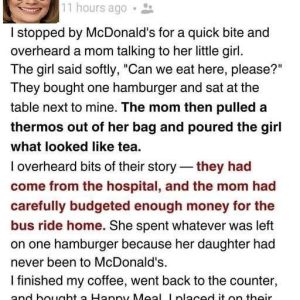My packages kept vanishing after a young woman moved in across the street. One night, I caught her on camera stealing a box at 1 a.m. Instead of calling the cops, I decided to teach her a lesson. The next night, I left a fake package outside—with something inside that would make sure she’d never forget what she did.
I filled the box with a bunch of small, noisy alarms and one of those glitter bombs people use for prank videos. When the package was moved, the alarms went off, and glitter exploded everywhere. I watched from my upstairs window as the young woman, wearing a faded green hoodie, grabbed the box. The second she stepped off my porch, a loud screeching noise erupted, and rainbow glitter covered her from head to toe.
She screamed and ran across the street, but the alarms kept blaring as she tried to pull them off. I’ll admit it: I laughed until I cried. But when I looked closer, I noticed something strange. She didn’t just look shocked—she looked terrified, like someone who’d never imagined getting caught. And that’s when I realized this wasn’t just some petty thief.
The next morning, I saw her sitting on her porch, head in her hands. Her hoodie was gone, and she looked younger than I expected—barely in her early twenties. I decided to walk over, package footage on my phone as proof, but something stopped me. Her face. It wasn’t the face of a hardened criminal; it was the face of someone drowning.
I introduced myself as Orson. She said her name was Nella. Her voice shook like she hadn’t slept in days. I asked why she was stealing, and after a long pause, she told me the truth. She’d moved here after leaving an abusive boyfriend two towns over. She had no job, no money, and the shelter she tried to stay at was full. She’d been sleeping on the floor of the empty house she claimed was her aunt’s.
She stole packages hoping to find food or something to sell for bus fare. But instead of running from her problems, she ran straight into mine. I felt a strange pang of guilt. I never wanted to ruin her life—I just wanted my packages back.
I invited her inside for a cup of coffee. Her eyes welled up when she saw the inside of my home: neat, warm, and smelling of cinnamon from my morning oatmeal. She told me she hadn’t eaten a real meal in three days. I heated up leftover pasta, and she devoured it so fast I almost offered her seconds before she finished the first plate.
As we talked, I learned her mom had passed away two years ago, and she’d been on her own since. Every plan she made fell apart, and every friend she tried to stay with either took advantage of her or couldn’t afford to help. It was like every time she got her head above water, life pushed her back under.
The more I listened, the more I wondered if maybe the universe put her on my porch for a reason. But I also knew I couldn’t let her keep stealing. I offered her a deal: she’d help me with yard work and cleaning, and I’d pay her cash every week. She looked at me like I’d offered her the moon.
Our first day working together was awkward. She was nervous, and I was worried I’d made a mistake. But as the days passed, I noticed her confidence growing. She learned how to prune the rose bushes without cutting herself, and she was surprisingly good at organizing the garage—a task I’d put off for five years.
We even joked while hauling trash bags to the curb. It felt good to laugh with her. And it felt even better seeing her smile without fear in her eyes. But not everyone shared my view.
My neighbor, Mrs. Claiborne, who lived two doors down, saw us together and wasted no time spreading rumors. She told anyone who’d listen that I’d “hired a criminal” to work in my home. Soon, people avoided me at the grocery store. A few even crossed the street to avoid us when we walked to the bus stop.
I could see the shame growing in Nella’s eyes. One night, she told me she was planning to leave. She didn’t want to make my life harder. I begged her to stay, but I knew she felt like she was only making things worse.
The next morning, I went door to door in our neighborhood, explaining what had really happened. Some people listened. Others slammed their doors in my face. But a few kind souls offered support, even dropping off clothes and food for Nella. I realized that people can surprise you, both for better and worse.
That night, I called a friend of mine who owned a small bakery downtown. I told her about Nella and asked if she’d consider hiring her. After a long silence, my friend agreed to give her an interview. I stayed up until 2 a.m. helping Nella practice answers to typical interview questions.
The interview day came. I’d never seen her look so determined. She borrowed one of my late wife’s blouses, and it fit her perfectly. She returned three hours later, her face lit up like Christmas morning—she got the job.
From there, everything changed. She started working full-time, saving money, and even signed a lease on a tiny studio apartment above the bakery. She still came by on weekends to help me with the garden, and we’d sit on the porch drinking sweet tea as the sun set.
Months passed, and Nella thrived. She made friends at work and enrolled in night classes for culinary arts. Word got around about how she turned her life around. The same neighbors who once avoided us now waved or stopped to chat. Mrs. Claiborne even apologized one afternoon, bringing over a blueberry pie as a peace offering.
One day, I overheard Nella telling a coworker at the bakery how grateful she was for the second chance. She said the glitter bomb had been the worst and best thing that ever happened to her. It was like life forced her to face the truth—and gave her the help she never thought she’d get.
As for me, I learned something important, too. Sometimes people do bad things out of desperation, not malice. It’s easy to judge from a distance, but it takes real courage to look closer and see the person behind the mistakes.
There was one more twist I hadn’t expected. My friend who hired Nella had a son, Alaric, who managed the bakery’s business side. He and Nella became close. I’d watch from my table as they chatted and laughed in ways that made me think maybe something deeper was blooming.
One evening, Alaric came by my house to ask if he could take Nella out to dinner. His hands shook so badly I had to hide my smile. I gave him my blessing, and the two started dating soon after.
The best part? They treated each other with so much respect and care, like two people who’d seen enough darkness to truly value the light they found in each other. I felt like the proud father I’d never gotten to be.
By the time spring arrived, Nella invited me to a dinner she cooked entirely on her own—a three-course meal that left me speechless. Her eyes sparkled as she served each dish, and I couldn’t help but think back to the terrified young woman covered in glitter who’d once stood frozen on my porch.
I realized then that we both needed each other more than we knew. I gave her a chance to start fresh, and she gave me a sense of purpose I thought I’d lost when my wife passed. We saved each other in ways words can’t fully explain.
Months turned into a year, and Nella and Alaric announced their engagement. They planned a small ceremony in the bakery’s courtyard, surrounded by friends, coworkers, and the neighbors who’d come to love her. She asked me to walk her down the aisle. I cried the entire time she asked.
On their wedding day, the sky was a perfect shade of blue. The same neighbors who once whispered behind our backs clapped and cheered as she and Alaric said their vows. Mrs. Claiborne sat in the front row, dabbing tears from her eyes.
After the ceremony, Nella pulled me aside. She pressed a small box into my hand. Inside was a silver keychain shaped like a tiny house. Engraved on it were the words: “You gave me a home when I had none.”
It was the most meaningful gift I’d ever received.
When I look back on everything that happened, I see how a moment of frustration led to something beautiful. If I’d called the cops that night instead of trying to teach her a lesson, I might have destroyed her last chance at hope. And I would have missed out on one of the most rewarding friendships of my life.
The lesson I carry with me is simple: never assume you know someone’s story from a single bad choice. A little kindness, a second chance, and an open heart can change everything—not just for them, but for you too.
If you’ve ever been in a situation where you had to choose between judgment and compassion, I hope you choose compassion. You never know how much of a difference it might make.
And if you found this story moving, please share it with your friends and family. Let’s spread a little hope together.





